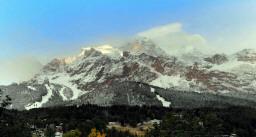Hoping for a positive verdict on its bid to have Dolomite mountain groups included in the United Nations World Heritage List, Italy has set up a Dolomites UNESCO Foundation.
The Dolomiti-Dolomiten-Dolomites-Dolomitis UNESCO Foundation hopes to swing into action once the World Heritage Committee approves Italy's petition.
The committee will meet in Seville from June 22 to 30 to consider applications from around the world.
The World Heritage Committee's technical advisory body on natural heritage, the International Union for the Conservation of Nature (IUCN), endorsed the Dolomite application on May 11.
The much hoped-for nod is expected on June 27.
The main objectives of the new foundation are to coordinate local and regional agencies and insure the competent management of the nine groups of mountains included in the application to join the prestigious list of World Heritage Sites.
A working group will be instituted to draw up a joint plan of action and suggest operational methods.
Important conservation and sustainable development goals include managing tourist flow, creating public understanding and carrying out research specifically geared to promote and protect the mountains.
The Dolomites are a valuable natural asset and Italians are keen to protect them without reducing access.
Italy considers the mountains to be an extraordinary open-air museum of the earth's geological evolution.
The mountains are also part of one of the world's most spectacular landscapes in an area which has been inhabited by man for millennia.
But the fossil-rich former archipelago, pushed up from the oceans around 90 million years ago, has been inevitably overlaid by a complex grid of institutional and administrative bodies.
The Dolomite mountain range spans three different regions and five provinces, all with different civic regulations, where four languages are spoken: Italian, German, Ladin and Friulan.
This high-altitude museum is partly in the province of Belluno, in the Veneto region; partly in the provinces of Pordenone and Udine in the Friuli Venezia Giulia region; and partly in the internationally guaranteed autonomous provinces of Bolzano and Trento which together constitute a self-governing region.
If the Dolomites are confirmed as a World Heritage Site, providing long-term protection and positive management for the mountain groups will no longer be solely the responsibility of the local administrative bodies: the whole world will be concerned.
This will call for a broader understanding of the environmental protection and sustainable development necessary and will provide the stimulus to comprehensively reconsider the mountain sites in terms of culture, landscape, and heritage.
If the nomination is confirmed by the World Heritage Committee, sustainable development in the Dolomites will have to be considered in a global context.
The Dolomites UNESCO Foundation has been created as an overarching organization to pursue these aims, ensuring the long-term conservation of the Dolomites while allowing its earth science potential and tourism-boosting assets to be used to the full.
